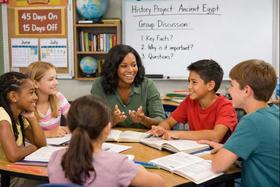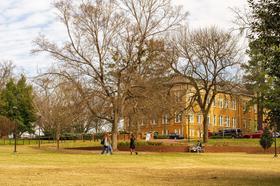Serving 437 students in grades Kindergarten-6, Matsuyama Elementary School ranks in the top 30% of all schools in California for overall test scores (math proficiency is top 20%, and reading proficiency is top 20%).
The percentage of students achieving proficiency in math is 51% (which is higher than the California state average of 34%). The percentage of students achieving proficiency in reading/language arts is 59% (which is higher than the California state average of 47%).
The student-teacher ratio of 23:1 is higher than the California state level of 21:1.
Minority enrollment is 86% of the student body (majority Hispanic and Asian), which is higher than the California state average of 80% (majority Hispanic).
Quick Facts (2026)
- Grades: Kindergarten-6
- Enrollment: 437 students
- Student-Teacher Ratio: 23:1
- Minority Enrollment: 86%
- Overall Testing Rank: Top 30% in CA
- Math Proficiency: 51% (Top 20%)
- Reading Proficiency: 59% (Top 30%)
- Science Proficiency: 50-54% (Top 20%)
- Source: National Center for Education Statistics (NCES), CA Dept. of Education
Top Rankings
Matsuyama Elementary School ranks among the top 20% of public schools in California for:
Category
Attribute
Math Proficiency
Science Proficiency
Diversity
School Overview
Matsuyama Elementary School's student population of 437 students has declined by 17% over five school years.
The teacher population of 19 teachers has declined by 13% over five school years.
Grades Offered
Grades Kindergarten-6
Total Students
437 students
Gender %
Total Classroom Teachers
19 teachers
Year Founded
1905
School Rankings
Matsuyama Elementary School ranks within the top 30% of all 9,523 schools in California (based off of combined math and reading proficiency testing data).
The diversity score of Matsuyama Elementary School is 0.78, which is more than the diversity score at state average of 0.63. The school's diversity has stayed relatively flat over five school years.
Overall Testing Rank
#1987 out of 9523 schools
(Top 30%)
(Top 30%)
Math Test Scores (% Proficient)
51%
34%
Reading/Language Arts Test Scores (% Proficient)
59%
47%
Science Test Scores (% Proficient)
50-54%
29%
Student-Teacher Ratio
23:1
21:1
American Indian
n/a
1%
Asian
24%
12%
Hispanic
33%
56%
Black
13%
5%
White
14%
20%
Hawaiian
1%
n/a
Two or more races
15%
6%
All Ethnic Groups
Eligible for Free Lunch
38%
54%
Eligible for Reduced Lunch
9%
8%
School Statewide Testing
School District Name
Source: National Center for Education Statistics (NCES), CA Dept. of Education
Profile last updated: 02/09/2025
Frequently Asked Questions
What is Matsuyama Elementary School's ranking?
Matsuyama Elementary School is ranked #1987 out of 9,523 schools, which ranks it among the top 30% of public schools in California.
What schools are Matsuyama Elementary School often compared to?
Matsuyama Elementary Schoolis often viewed alongside schools like Caroline Wenzel Elementary School, Alice Birney Waldorf-inspired by visitors of our site.
What percent of students have achieved state testing proficiency in math and reading?
51% of students have achieved math proficiency (compared to the 34% CA state average), while 59% of students have achieved reading proficiency (compared to the 47% CA state average).
How many students attend Matsuyama Elementary School?
437 students attend Matsuyama Elementary School.
What is the racial composition of the student body?
33% of Matsuyama Elementary School students are Hispanic, 24% of students are Asian, 15% of students are Two or more races, 14% of students are White, 13% of students are Black, and 1% of students are Hawaiian.
What is the student-teacher ratio of Matsuyama Elementary School?
Matsuyama Elementary School has a student ration of 23:1, which is higher than the California state average of 21:1.
What grades does Matsuyama Elementary School offer ?
Matsuyama Elementary School offers enrollment in grades Kindergarten-6
What school district is Matsuyama Elementary School part of?
Matsuyama Elementary School is part of Sacramento City Unified School District.
In what neighborhood is Matsuyama Elementary School located?
Matsuyama Elementary School is located in the Southwestern Sacramento neighborhood of Sacramento, CA. There are 28 other public schools located in Southwestern Sacramento.
School Reviews
Review Matsuyama Elementary School. Reviews should be a few sentences in length. Please include any comments on:
- Quality of academic programs, teachers, and facilities
- Availability of music, art, sports and other extracurricular activities
Recent Articles

Year-Round Schooling in 2026: Updated Parent Guide
Explore the latest 2026 data, trends, costs, and parent planning tips in the ongoing debate over year-round schooling vs the traditional calendar.

No Child Left Behind: Past, Present, and Future of U.S. School Policy
Explore how No Child Left Behind evolved into ESSA, what it means for 2025‑26 schooling, and what parents need to know about testing, admissions planning, and funding.

Understanding Public School Fees & Optional Costs Guide
Discover what public school fees are required versus optional, with 2026 updates for parents, students, and educators on budgeting and planning.






